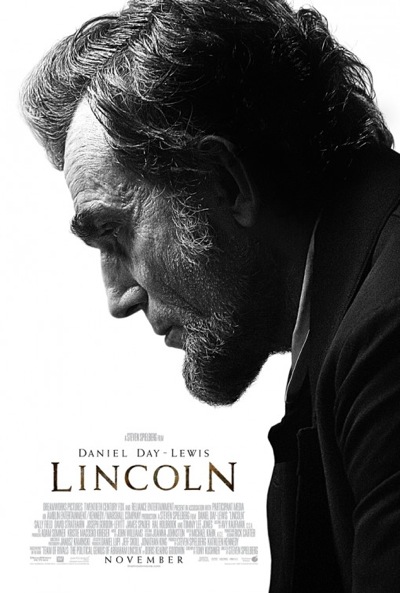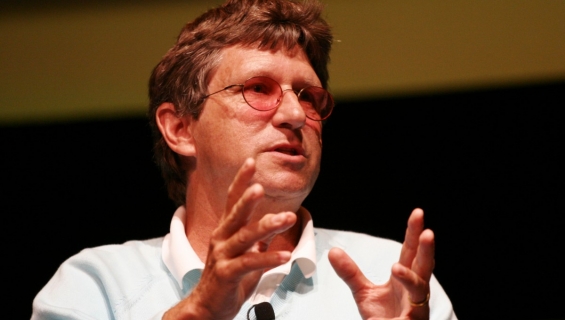
Steven Spielberg has long enjoyed the luxury of collaborating with the some of the most skilled artists in the business. Typically, the focus is on the stars: Tom Cruise, Harrison Ford, Tom Hanks or, in the case of his latest, LINCOLN, Daniel Day-Lewis. But it's rare that we get to hear from the brilliant designers who make essential contributions to the look and mood of his films.
So when Disney convened a press day with the "below-the-line talent" on LINCOLN, I was thrilled - in particular because I'd long wanted to chat with production designer Rick Carter and costume designer Joanna Johnston. They're practically a team, having worked together on Robert Zemeckis's BACK TO THE FUTURE sequels, the hugely underrated DEATH BECOMES HER and FORREST GUMP, as well as a number of Spielberg projects (WAR OF THE WORLDS, MUNICH and WAR HORSE). Most importantly, at least to this cinephile, they also had a hand in designing a couple of cult classics - Carter as an art designer on THE ADVENTURES OF BUCKAROO BANZAI ACROSS THE 8TH DIMENSION and Johnston on Clive Barker's first HELLRAISER.
I was under tight time constraints when I sat down with Carter and Johnston, so this isn't a casual stroll through their amazing filmographies. It's actually not a design-heavy discussion at all. As we were introduced, Carter was struck by my affiliation with Ain't It Cool News, and immediately launched into a disquisition on why he thinks the film might carry more weight with older viewers. This sent the interview off in an unexpected direction, but if you've seen LINCOLN (and I hope you have), I think this is a fascinating conversation about thematic intent from a design perspective.

Rick Carter: So you liked the movie?
Mr. Beaks: I did.
Rick Carter: Oh good. I'm aware of Ain't It Cool. I'm aware of the reviews and all of that, and I'm surprised. Not because of any preconception, but it's so easy in that movie as presented, just to be direct, because from the very beginning it takes a certain course, especially in that first scene, in which it sets things up, and it actually asks you for some emotion. And you're not prepared really to give any emotion, because you just walked in off the street. So all you really have to go on in that first scene is, "I think I might be able to believe this guy as Lincoln." Subliminally, I think that scene is setting you up that there is something at stake, and we're coming into this with something already having happened for the last three years. There are significant things that you are sort of aware of. The first part is so methodical, like fly-on-the-wall hearing what's at stake and who's doing what and who's a Republican and who's a Democrat... it's like, "I can't even follow what's going on here. I know Lincoln freed the slaves, but what are we talking about?" So to get wrapped up in a different pace with this character... if it hits you... it weaves a kind of a spell that, if by the end of the movie you've gone with it, you realize at moments, "Wait a minute. I know how this is going to end. Why am I caught up in this at all? I know they're going to pass this." But then you're saying, "Wait. How is he going to pass this?" It just starts building this process of fairness and justice, and then it gets into the whole thing with Robert. Any of us who are older, the whole idea of going into the Army, and then fighting with your father not to go into the Army, and how that might turn around. I know as you get older it's easier to feel the gravitas and this sense that something before you mattered, because you've had your own life. Philosophically, I'm interested. I'm as interested in your response as you might be in what we have to say.
Mr. Beaks: Believe me, I could discuss this all day. Relating somewhat to my reaction, I was saying to Joanna earlier that this feels like a different film for Spielberg. It's not that he hasn't had meaningful collaborations with other writers, it's just that I feel Tony Kushner's voice is as present as Spielberg's. I can't think of another Spielberg film where this has been the case. You've both been working with Spielberg for quite some time. From a collaborative perspective, did this feel different for you?
Carter: For me, absolutely. I started on this more than a decade ago when it was in a different form, and watched it evolve. For Tony to get a script that Daniel could respond to... that triangle. When Daniel forms that triangle [in the telegraph office], there's a way that this movie is a triangle. There is something on a metaphoric level where the three of those men collaborating all balanced each other and created a kind of equality, which I think is what you're feeling. Steven is, on one level, a step back, but he's setting the whole thing up so that Daniel can come in and be the President. But he's also giving a context within which Tony Kushner was there every day making up new scenes and words - and the nuances, the house of cards that he was creating daily, even though he'd written the script before, was unlike anything I'd ever seen. And the power of somebody at the center of it, asking for you not just to suspend your disbelief, but saying, "Look into my eyes and believe that I am Lincoln." There is something different about that. How would you characterize it?

Joanna Johnston: I think that threesome, the extraordinary importance of those three players, there wasn't one greater than the other. It was an absolutely equal table. I was thinking about it this morning, but there is something slightly sacred about this film. I don't quite know why. Obviously, you could say it's because of the subject matter, but there was something in the way we processed our work. I felt it was sacred, and that there was a sort of respect. When I first came on to Rick's White House set, when it was finished and ready to go... I walked in for the first time and the atmosphere... it was a new build, but the atmosphere was already heavy, and it was already dense. I felt you could smell it. And I went into Mary Todd's bedroom, and it was like it had always been.
Carter: A big part of that is Jim Erickson, the set decorator, who is not only brilliant, but a great collaborator. He went out and found all of that furniture. We had the wallpapers made and the carpets, and all the things that would be details in any other movie where you're trying to be historical and accurate. But something about the purposefulness we all instinctively understood - and it was bigger than that triangle. Lincoln was the Euclid; he was the one who discovered what was self-evident. And Tony, Daniel and Steven were the ones coming up with the way to interpret that truth, that self-evident, obvious truth as an artistic premise. And then we all come from there, all of us who've collaborated with Steven in our various ways.
But I think there's a sense of discovery that the movie has in the purpose of trying to define something to help lead us even now, not so much literally, but... the fact that you can find in history things that we now consider 150 years later self-evident. They aren't always. You have to create them. Euclid had to understand... if I say to you something as ridiculously obvious as "anything equal to something is equal to each other," you're going, "Well, what's the distinction?" The distinction that's really underlying that is any human being in relationship to God is equal, thus they must be equal to each other. That's not a premise we have now. I understand. But the point is we do have a premise that we're working off now, and when he states at the end of that whole philosophical point of view, "Will we create something that might be worthy of..." and then you fill in the blank, we're there now. That's an interesting thing. I've never been on a movie that's like that. From Ain't It Cool News' point of view, it's like, "Yeah, well, I kinda just paid my money so I could have a good time." We've all been involved in movies that are about action. But this is action inside the brain, if it goes there.
Beaks: It does. I think that's primarily a testament to Kushner's screenplay. And I can feel the reverence and thoughtfulness that he brought to the project in your work. This isn't just a standard biopic with typical sets and costumes from the period. There's a lived-in quality to everything, a verisimilitude, that gives the drama an immediacy.
Carter: Even a simple thing... if we're in a conversation where you are opposite where I'm coming from, and you invoke a certain level, and I say to you, as is said in the movie, "In my day, I found that a compass is very helpful as to which direction I want to go, but it doesn't tell me anything about how to get there or what I might encounter along the way." Right there, you realize, at least for me, "Wow. I'm not sure I think that way." I will sometimes think, "If I just know the truth, that's all I need to know." And then it can stay unrealizable forever, because I might not be able to get there. I can't do whatever I need to do, so what good is it to know true north?
(The publicist informs me that I have to wrap it up.)
Beaks: We hear so much about Daniel Day-Lewis's commitment to character. Did you feel he had more input into your work than other actors have had before?
Johnston: Not more than others, but Daniel goes into a place where he immerses himself totally. You can't give a performance thus without doing something quite remarkable in your preparation. Everything is very considered and met with intelligent thought and discussed. It's a process that, for me, was a lot of small moves to help build up this silhouette of the known man. It was lovely. I started on him before I did anyone else. I wanted to clear a space with him, and it was really nice to do that. He was in Ireland and I was in England, and it was like a small painting.
Carter: I've only met Daniel Day-Lewis once, and that was four weeks before we started shooting, when he came to visit the set under construction. After that, for the next four months, he was President Abraham Lincoln. I can assure you that tonight I'm looking forward to meeting Daniel Day-Lewis for the second time. [There was a guild screening later that evening.]
Beaks: (Laughs) Thank you. This was great. I've been a fan of yours for quite some time. Cenobites and BUCKAROO BANZAI!
Carter: BUCKAROO BANZAI! What happened to the 5th, 6th and 7th Dimensions? I guess they didn't matter.
Beaks: I think there's still time to visit them.
Carter: Let me just show you what it's like to meet Daniel Day-Lewis [on set as Lincoln]. I'm walking down the corridor and he catches my eye and does this... (Carter shakes my hand firmly while clasping the back of my elbow). That's how it was.
And that's all the time we had. Hopefully, I'll get to go more in depth with both of these amazing artists one day. Until then, get out and see LINCOLN, which is in theaters now.
Faithfully submitted,
